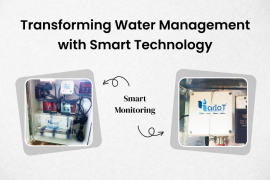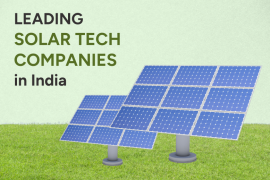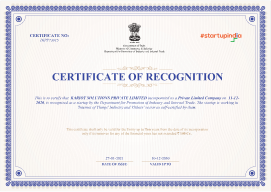India generates 62 million tons of waste annually, expected to reach 165 million tons by 2030. With growing urbanization, efficient waste management is crucial for sustainability. Leading waste management companies in India handle solid waste, e-waste, biomedical waste, and industrial waste through recycling, composting, and waste-to-energy solutions. Government initiatives like the Swachh Bharat Mission drive industry growth. This blog highlights the top waste management companies in India and their role in building a cleaner, greener future.
Understanding Waste Management in India
Waste management involves the collection, transportation, treatment, and disposal of waste materials. It ensures that waste is processed in a manner that is environmentally friendly and sustainable. The Union Ministry of Environment, Forests, and Climate Change also oversees waste management regulations in India, enforcing principles like sustainable development, precaution, and polluter pay.
However, India faces several waste management challenges due to its growing population and lack of infrastructure. Addressing these issues requires policy enforcement, technological innovations, and community participation. Implementing IoT tank level monitoring and smart water meters can enhance efficiency in tracking liquid waste disposal and monitoring landfill leachate treatment.
Key Statistics on Waste Management in India
- India generates 62 million tonnes of waste each year. Of this, 70% is collected, but only 12 million tonnes undergo treatment. The remaining 31 million tonnes are disposed of in landfills.
- Additionally, due to shifts in consumption behaviors and swift economic development, the amount of municipal solid waste is projected to increase to 165 million tonnes by 2030.
Challenges of Waste Management in Urban India
Waste management in urban India faces critical issues, from insufficient infrastructure to poor recycling practices, exacerbating environmental concerns.

Rapid Urban Growth: India’s urban population of 377 million produces approximately 62 million tons of solid waste annually. Out of this, only 43 million tons are collected, leaving a significant amount still untreated or disposed of in landfills.
Increasing E-Waste: There is a noticeable rise in e-waste, with future projections indicating a considerable increase in volume.
Insufficient Collection Infrastructure: The country has only about 21 million garbage collectors, a stark contrast to China’s 700 million, further highlighting inadequate waste collection infrastructure.
Inefficient Sorting: Only around 30% of waste in India is correctly sorted. This inefficiency also causes recyclable materials like aluminum and plastics to be lost to landfills, missing opportunities for recycling.
Addressing these challenges requires investment in technology, public awareness campaigns, and strict enforcement of regulations. Additionally, Industrial IoT can help optimize waste collection routes and improve operational efficiency for waste management companies.
Types of Waste Generated and Their Impact
India generates various types of waste, each with a different environmental impact. The primary categories include:
- Municipal Solid Waste (MSW): Household and commercial waste, including plastics, paper, and organic materials.
- E-waste: Discarded electronic devices that contain hazardous chemicals.
- Industrial Waste: Chemicals, metals, and other waste products from factories and manufacturing units.
- Biomedical Waste: Medical and hospital waste that requires special disposal procedures.
- Agricultural Waste: Crop residues and organic waste from farming activities.
Proper waste management strategies for each category can reduce environmental degradation and improve sustainability. Integrating IoT remote monitoring solutions can enhance tracking and management of hazardous and industrial waste, ensuring compliance with environmental regulations.
Best Practices in Waste Management
Implementing best practices in waste management can lead to a cleaner environment and better resource utilization. Here are some key strategies:
1. Waste Segregation at Source
Segregating waste at the source is the first step in effective waste management. It involves separating biodegradable, recyclable, and hazardous waste before disposal. Cities like Indore and Pune have implemented robust segregation programs, significantly reducing landfill waste.
2. Recycling and Reuse
Recycling waste materials like plastic, paper, metal, and glass helps reduce resource consumption and minimizes pollution. Companies are adopting circular economy models to recycle and repurpose waste.
3. Composting Organic Waste
Organic waste, including food and garden waste, can be converted into compost through bio-methanation and vermicomposting. This reduces landfill burden while producing nutrient-rich soil enhancers.
4. Waste-to-Energy (WTE) Initiatives
Converting waste into energy is a sustainable way to manage organic and industrial waste. Bio-methanation, incineration, and pyrolysis are methods used to generate electricity from waste.
5. Adoption of Technology in Waste Management
Using RFID tracking, GPS-enabled waste collection vehicles, and AI-based sorting can improve efficiency in waste management systems. Smart bins and digital monitoring tools also help track waste collection and disposal.
6. Public Awareness and Participation
Educating communities about waste segregation, recycling, and responsible disposal is crucial. Public-private partnerships and community-driven programs play a significant role in successful waste management.
7. Government Policies and Regulations
The government has introduced several policies to improve waste management, including the Solid Waste Management Rules (2016), Plastic Waste Management Rules, and E-Waste Management Rules. These regulations promote accountability among industries and municipalities.
8. Circular Economy in Waste Management
The circular economy focuses on minimizing waste and maximizing resource efficiency by reusing recycling, and repurposing materials. Companies are adopting this model to reduce their environmental footprint.
How Technology is Transforming Waste Management in India
The integration of technology in waste management is improving efficiency and sustainability. Some technological advancements include:
- Smart Waste Collection Systems: Sensors in bins alert authorities when waste needs collection.
- AI-Powered Waste Sorting: Artificial intelligence assists in identifying and segregating recyclable materials.
- Blockchain for Waste Tracking: Helps in ensuring transparency in waste disposal processes.
- Mobile Apps for Waste Management: Platforms that connect citizens with waste collection services.
Technology-driven solutions can significantly enhance waste management efficiency across urban and rural India.
List of Waste Management Companies in India

1. NEPRA
2. evolute
3. Metastable Materials
4. ExtraCarbon
5. Saahas Zero Waste
6. rePurpose
7. Urban Trash
8. ACE Green Recycling
9. GPS
10. Strawcture
Let’s explore innovative waste management solutions and collaborative opportunities with industry leaders in India to promote sustainable practices.
1. NEPRA
Specialization: Dry Waste Management, Recycling
NEPRA is one of India’s leading dry waste management companies, focusing on recycling and material recovery. It partners with urban local bodies, businesses, and industries to efficiently manage plastic waste, paper waste, and other recyclables. NEPRA operates fully automated Material Recovery Facilities (MRFs) that segregate and process dry waste, reducing landfill dependency.
Key Contributions:
- Processes hundreds of tons of dry waste daily.
- Works with waste pickers and informal sector workers, improving their livelihoods.
- Supports corporate sustainability goals through Extended Producer Responsibility (EPR) solutions.
2. Evolute
Specialization: E-waste recycling, Circular Economy Solutions
Evolute is a leading player in electronic waste (e-waste) management, ensuring the proper disposal and recycling of electronic devices. The company works with IT firms, manufacturers, and government agencies to recover valuable metals from discarded electronics, minimizing environmental damage.
Key Contributions:
- Recycles e-waste sustainably, preventing toxic pollution.
- Uses advanced material recovery methods for efficient processing.
- Supports India’s zero-waste to landfill movement.
3. Metastable Materials
Specialization: Lithium-Ion Battery Recycling
Metastable Materials is revolutionizing battery waste management by offering sustainable lithium-ion battery recycling solutions. As the demand for electric vehicles (EVs) and electronic devices grows, safe battery disposal is crucial. The company uses advanced chemical processes to extract cobalt, nickel, and lithium from used batteries, promoting a circular economy.
Key Contributions:
- Recycles end-of-life batteries to recover rare metals.
- Reduces dependence on mining by extracting materials from e-waste.
- Supports India’s EV and renewable energy industries with sustainable battery disposal.
4. ExtraCarbon
Specialization: Waste Collection, Recycling, Incentivized Waste Disposal
ExtraCarbon is an innovative waste collection and recycling platform that rewards people for segregating and disposing of their waste responsibly. The company offers doorstep pickup services for dry waste, including plastics, paper, glass, and metal, and ensures proper recycling through authorized channels.
Key Contributions:
- Encourages citizens to participate in waste segregation through incentives.
- Reduces landfill burden by diverting recyclables to the right processing centers.
- Supports waste pickers and small recyclers in India.
5. Saahas Zero Waste
Specialization: Zero-waste solutions, Corporate & Industrial Waste Management
Saahas Zero Waste is dedicated to zero-waste solutions for businesses, industries, and residential communities. The company provides end-to-end waste management services, including waste audits, recycling programs, and composting solutions. It also works with brands to implement Extended Producer Responsibility (EPR) initiatives.
Key Contributions:
- Helps companies achieve 100% waste compliance.
- Converts organic waste into compost and biogas.
- Reduces the carbon footprint of businesses through waste diversion strategies.
6. rePurpose
Specialization: Plastic Waste Management, Sustainability Consulting
rePurpose is one of India’s leading plastic waste management companies, helping businesses offset their plastic footprint. Through its Plastic Credit system, it funds the removal of plastic waste from the environment and supports waste workers in India.
Key Contributions:
- Enables brands to become plastic-neutral.
- Removes tons of plastic waste from oceans and landfills every year.
- Works with recyclers and NGOs to create a sustainable waste ecosystem.
7. Urban Trash
Specialization: Household Waste Collection, Recycling
Urban Trash focuses on doorstep waste collection and recycling, making it easier for citizens to dispose of waste responsibly. The company provides a mobile app-based waste pickup service, ensuring segregation, recycling, and responsible disposal of household and office waste.
Key Contributions:
- Offers on-demand waste pickup services for individuals and businesses.
- Reduces dumping of recyclable materials in landfills.
- Encourages waste segregation through a user-friendly digital platform.
8. ACE Green Recycling
Specialization: Industrial Waste, Metal Recycling, E-Waste
ACE Green Recycling is a leader in metal and battery recycling. It uses proprietary non-polluting technology to recycle lead-acid and lithium-ion batteries, reducing hazardous waste. The company also specializes in recycling electronic waste and industrial metal scraps.
Key Contributions:
- Reduces pollution from battery disposal through green technology.
- Supplies recycled metals for various industries, reducing the need for mining.
- Operates eco-friendly recycling facilities in India and abroad.
9. GPS Renewables
Specialization: Waste-to-Energy, Biogas Production
GPS Renewables is a pioneer in waste-to-energy solutions, converting food waste and organic waste into biogas and renewable energy. The company’s bio-digesters help industries, hotels, and cities reduce their dependence on fossil fuels by generating clean energy from organic waste.
Key Contributions:
- Helps businesses achieve carbon neutrality by using biogas.
- Reduces food waste pollution through sustainable waste processing.
- Supports India’s renewable energy sector with innovative bio-energy solutions.
10. Strawcture Eco
Specialization: Agricultural Waste Recycling, Sustainable Construction Materials
Strawcture Eco focuses on recycling agricultural waste into eco-friendly construction materials. The company manufactures compressed straw panels, which are used as sustainable building materials, reducing the carbon footprint of the construction industry.
Key Contributions:
- Converts crop waste into durable building materials, reducing stubble burning.
- Promotes eco-friendly architecture by replacing traditional materials.
- Helps reduce air pollution and deforestation through sustainable alternatives.
Benefits of Waste Management in India
Effective waste management in India offers several significant benefits that contribute to both environmental sustainability and economic growth:

- Environmental Protection: Effective waste management in India plays a crucial role in mitigating pollution, reducing disease transmission, and curbing environmental degradation. It ensures the safe handling and disposal of hazardous materials, safeguarding the quality of air, water, and soil.
- Resource Recovery: Waste management in India facilitates the recycling and reuse of materials, conserving natural resources and diminishing the need for raw materials. This efficiency not only conserves energy but also cuts down on greenhouse gas emissions from manufacturing processes.
- Economic Benefits: In India, waste management opens up economic prospects through the recycling sector, waste-to-energy projects, and other related industries. It is employed in the areas of waste collection, sorting, and processing.
- Health Improvements: Proper waste disposal methods through waste management in India help reduce the occurrence of health issues linked to inadequate sanitation, such as respiratory conditions, gastrointestinal infections, and other infectious diseases. Cleaner environments significantly contribute to public health and wellness.
- Enhanced Quality of Life: Clean cities and communities in India enhance residents’ quality of life. Effective waste management in India maintains cleaner public areas, reducing visual pollution and unpleasant smells, and promoting community pride and cohesion.
- Climate Change Mitigation: In India, initiatives like recycling and converting waste to energy are pivotal in combating climate change. These efforts help reduce greenhouse gas emissions that arise from landfill decomposition and the extraction of raw materials.
- Sustainability for Future Generations: By adopting comprehensive waste management strategies, waste management in India ensures the preservation of environmental resources for future generations, aligning with global sustainable development goals.
Leveraging smart water management, IoT tank level monitoring, and smart irrigation systems using IoT can further optimize waste-to-energy and resource recovery efforts.
Future Trends and Innovations in India’s Waste Management Sector
The future of waste management in India is expected to witness significant advancements, including:
- Expansion of Waste-to-Energy Projects: More investment in converting waste into biofuels and electricity.
- Increased Use of AI and Robotics: Automation for efficient waste sorting and management.
- Decentralized Waste Processing Units: Localized waste treatment to reduce landfill dependency.
- Stronger Public-Private Partnerships: Government and corporate collaborations for waste management solutions.
- Greater Emphasis on Sustainable Packaging: Encouraging biodegradable and recyclable materials in product packaging.
By adopting these innovations, India can move towards a more sustainable waste management system.
conclusion
Waste management in India is crucial for public health, environmental sustainability, and economic growth. By implementing best practices such as waste segregation, recycling, composting, and waste-to-energy projects, India can manage waste more efficiently. Companies like NEPRA, Evolute, and GPS Renewables are leading the way by adopting innovative solutions.
With government support, technological advancements, and community participation, India can achieve a sustainable future in waste management. A cleaner, greener, and healthier India is possible if we all contribute to responsible waste disposal and recycling efforts. Join the movement towards a waste-free nation!








